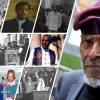The End Equals the Beginning: There Is No Black America, Says the President
Tuesday night looked so good, I almost didn’t pay attention to what President Barack Obama was saying. I did notice that he morphed back into his 2004 happy-warrior persona, attempting to tie a yellow ribbon around a country containing a substantial white population that will hate his Muslim, gun-removing, socialism-promoting presidency to his dying breath.
“Unarmed truth and unconditional love will have the final word,” he said.
Sounded good. Obama always finds a way to bring it—particularly when he chooses, as he frequently does, to paraphrase Martin Luther King Jr. in word or speech structure. This final time, it was in word.
“I believe that unarmed truth and unconditional love will have the final word in reality. This is why right, temporarily defeated, is stronger than evil triumphant.”
That’s from King’s 1964 Nobel Prize acceptance speech. This is the King whose bust is in Obama’s Oval Office. This is the King the president paraphrases after bombing seven countries in as many years, which he did after a 2009 Nobel Peace Prize acceptance speech in which he said, as head of state, that he could not follow King or Mahatma Gandhi alone.
“Acceptance” is the key word here. Black America has now gone through stages of acceptance since it adopted, and accepted, Barack Obama 12 years ago.
First we accepted in 2004 that he said at the Democratic National Convention that there is no black America.
Then we accepted that he was a serious candidate for president in 2008. Then we accepted that he could, and would, win the presidency without being assassinated.
We followed that up by accepting that he would only have symbolic value, because we accepted that we would not ever publicly challenge him the way we historically challenge those in charge of what King called the triple evils of racism, militarism and economic exploitation, no matter what.
We accepted that his bop, his purposeful dropping of “g’s” at very specific times, his open singing of Al Green and gospel spirituals and his inviting Earth, Wind & Fire to the White House, were proof of ouracceptance in America.
Now we accept that Obama is on a victory lap as president, his and Michelle Obama’s last turn at bat before being booked as keynote speakers for every national black convention for the next 20 years.
Obama’s words to the nation at the beginning of the speech made me think about the choices we must make in the forthcoming post-Obama era: “But such progress is not inevitable. It is the result of choices we make together. And we face such choices right now. Will we respond to the changes of our time with fear, turning inward as a nation, and turning against each other as a people? Or will we face the future with confidence in who we are, what we stand for, and the incredible things we can do together?”
Is this a Freudian slip on the president’s part? If so, it’s an interesting and, perhaps, ironic one, since so much black (radical) history has been deserted for his historical moment.
Thinkers such as Paul Robeson and Walter Rodney—and what they believed and fought for, at great personal cost—are just elective, college-class syllabus topics today.
A forthcoming PBS documentary on the Black Panther Party uses Cooley High as its storytelling framework instead of Lenin, Castro, Marx and Mao. Those four are not mentioned by name in the film.
Our well-paid Ivy League public intellectuals and media personalities openly end friendships and attack each other on radio, TV and in print because of their serious disagreements about how to intellectually handle Obama’s mixed legacy.
The president has been an appropriate symbol for 21st-century black amnesia. In 2016, most historical black radical edges have been smoothed out. Power suits are pressed. Approved speech has been mastered. Black America under Obama is solidly middle-of-the-road with only occasional viruses—like those irritating kids in Black Lives Matter!—mucking up its hard drive.
(Did anyone notice how the president substituted the word “justice” for “Black Lives” at the end, and then praised the police?)
“The protester determined to prove that justice matters, and the young cop walking the beat, treating everybody with respect, doing the brave, quiet work of keeping us safe.”
(Textbook Obama. I guess he’ll never get over how he had to apologize to that policeman who arrested Harvard professor Henry Louis Gates Jr. for breaking into his own house in 2009.)
In the Obama era, only the acceptable things are said and done because there is too much to be gained in America’s approving eyes, and now so much to be taken away if you step out of line.
But don’t take my word for it. Obama himself almost said this Tuesday night:
But if we give up now, then we forsake a better future. Those with money and power will gain greater control over the decisions that could send a young soldier to war, or allow another economic disaster, or roll back the equal rights and voting rights that generations of Americans have fought, even died, to secure. As frustration grows, there will be voices urging us to fall back into tribes, to scapegoat fellow citizens who don’t look like us, or pray like us, or vote like we do, or share the same background.
Obama said Tuesday night that Americans have to make change work for us. He was talking about the technological changes that have shaken American economic stability, but in this year of the 50th anniversary of the black power movement and the Black Panther Party (which, by the way, used armed truth and conditional love!), I swore I heard something else. I heard the pendulum beginning to swing back.
The Obama administration has been a great education for black America.
It’s not just that we relearned that old Frederick Douglass adage about power conceding only with a demand; we now reunderstand what we did 50 years ago: that there is no polite way for black people to ask for, and get, real political and social power that is in any way relevant to us. We no longer have to ask people who have the power we want to understand us, because we now know, via what we saw Obama go through in the last seven years, that they understand us all too well.
Power is the last word in which I’m interested. And the first.
We can thank Obama for that, at least, as he fades into half-symbolic dreams of red, white and blue, and the thousands of chicken dinners yet to come.
Todd Steven Burroughs, an independent researcher and writer based in Newark, N.J., is the author of Son-Shine on Cracked Sidewalks, an audiobook on Amiri Baraka and Ras Baraka through the eyes of the 2014 Newark mayoral campaign. He is the co-editor, along with Jared Ball, of A Lie of Reinvention: Correcting Manning Marable’s Malcolm X and the co-author, with Herb Boyd, of Civil Rights: Yesterday & Today.














